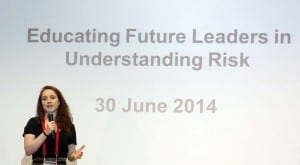Educating Future Leaders in Understanding Risk
By Joanna P Faure Walker, on 1 July 2014
 As part of the 2014 Understanding Risk Forum, UCL IRDR and UCL STEaPP co-chaired a session on ‘Educating Future Leaders in Understanding Risk’.
As part of the 2014 Understanding Risk Forum, UCL IRDR and UCL STEaPP co-chaired a session on ‘Educating Future Leaders in Understanding Risk’.
The very need for having a conference titled “Understanding Risk” suggests the actual topic under discussion is misunderstanding risk.
Indeed, misunderstanding risk is increasingly being seen as a barrier to risk and disaster reduction. Examples that demonstrate this include: During the 2014 UK floods, particular residents expressed disbelief when their houses were flooded in the worst floods in 30 years, despite their properties being in “low risk zones”, confusing low risk and no risk; and following the 2011 Great East Japan Earthquake, it became apparent that some residents did not understand the uncertainty associated with the tsunami warnings and therefore did not evacuate, despite living in a country which does have earthquake drills and hazard education in schools (see IRDR Special Report 2013-01). These are just two of many examples that could be drawn upon to demonstrate that a better understanding of risk is needed. However, the question is not whether a better understanding is needed, but how to achieve this.
How do we educate residents, stakeholders and future leaders in risk and disaster reduction?
When should people be educated? Should this start at school, university or work?
If this education is part of a formal curriculum, should it be integrated in the curriculum of existing subjects, or should risk be a separate subject?
A panel was gathered including representatives from academia, industry and practitioners to discuss their thoughts on risk education, what specific knowledge and skills they think are needed and how this should be provided in order to carry out work in understanding and managing risk, with specific references to their field.
The session was chaired by Dr Joanna Faure Walker, UCL IRDR, and Dr Natasha McCarthy, UCL STEaPP, who coordinate UCL Post Graduate Programmes in Risk, Disaster and Resilience and Public Administration respectively.
The panelists were:
Professor David Alexander, Professor of Risk and Disaster Reduction, UCL IRDR and course coordinator of the MRes in Risk and Disaster Reduction
Dr Robert Muir-Wood, Chief Research Officer, RMS
Mr Hamish Cameron, London Resilience Manager
Mr Stephane Jacobzone, Counsellor, Public Governance and Territorial Development Directorate, OECD
During this session, panelists and members of the floor focused not on specific knowledge needed, but rather themes and ways of thinking; for careers in risk and disaster reduction, the following were suggested as being desirable:
(1) Curiosity, skepticism of data, wanting to do research, “being a detective”
(2) A fundamental understanding of evidence, risk and uncertainty
(3) Being stake-holder or end-product focused
(4) How to build a good risk-assessment
and
(5) Seeing connections and coherence between different subjects connected to risk, i.e. seeking a holistic approach
Within the UCL IRDR MRes in Risk and Disaster Reduction and MSc in Risk, Disaster and Resilience we run modules in Emergency and Crisis Planning and Management, modules in integrating science into risk and disaster reduction and risk and disaster reduction research tools, which cover basic probability, the quantification or risk and uncertainty and a module in natural and anthropogenic hazards and vulnerability that enable students to appreciate what is known and what is unknown about these and what questions they should be asking. Through the IRDR post graduate programmes we hope to give students the five qualities mentioned above.
 Close
Close

